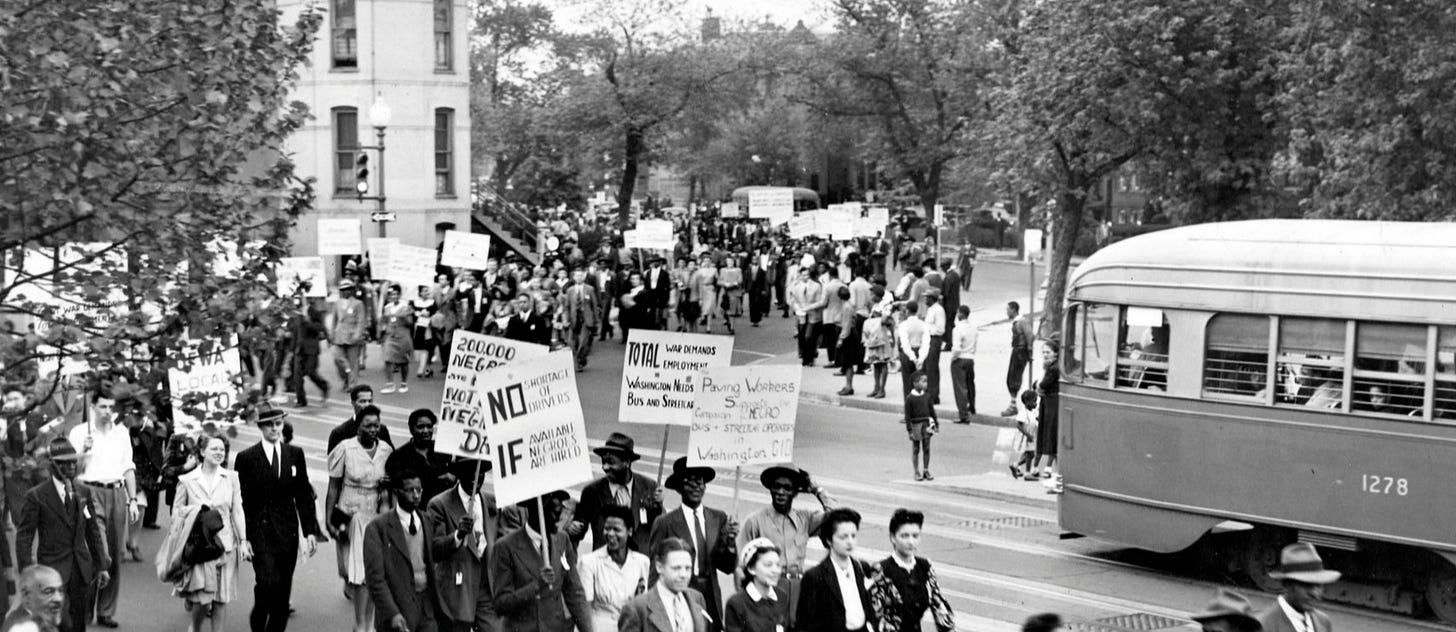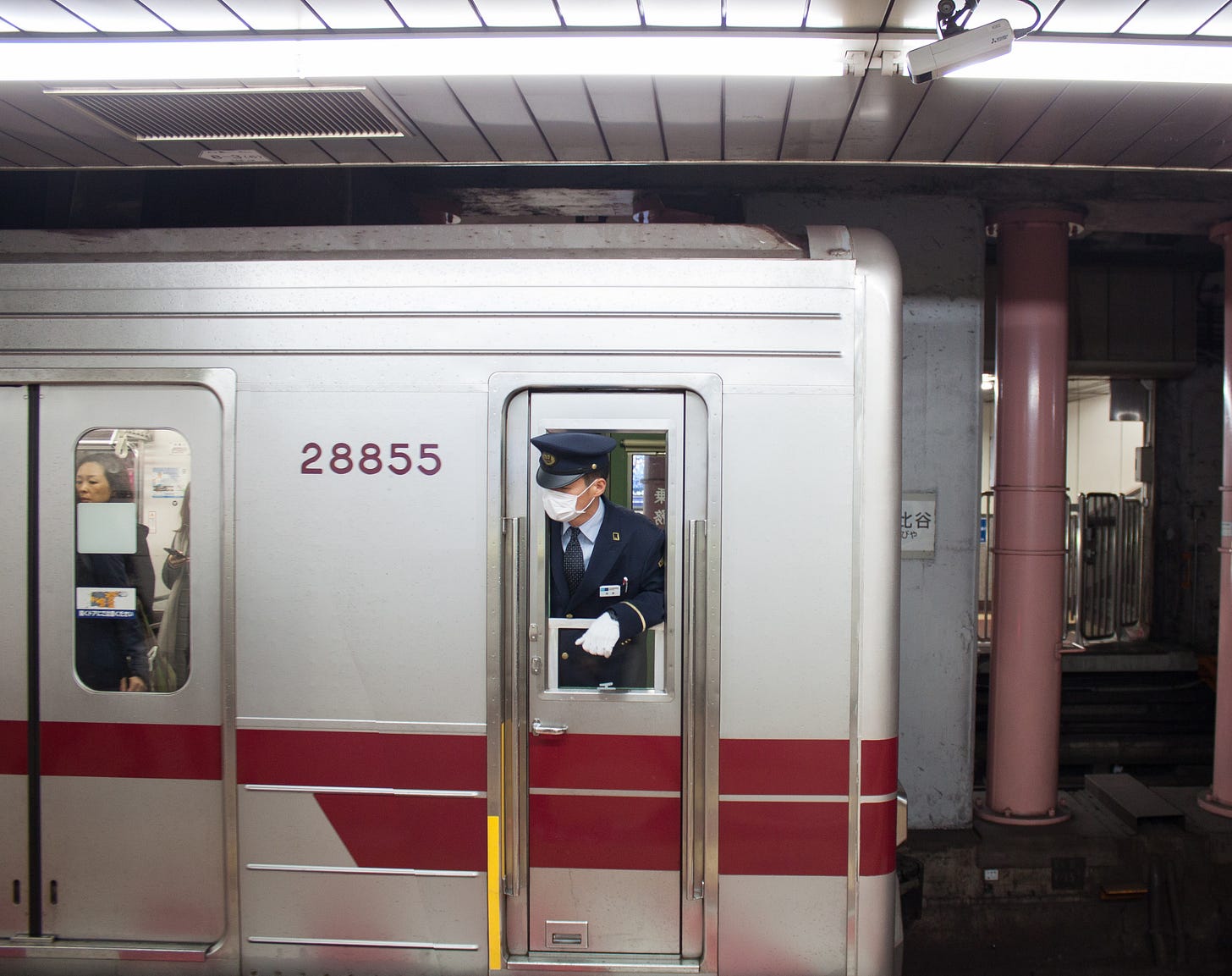MetroNow Dispatch 2.2021
How is February halfway gone?! Join us to celebrate Black History Month, break down federal transit funding & WMATA's capital budget, and imagine the post-COVID commute. Also, new FBI HQ?

Transit & Black History Month
This Black History Month, we take a moment recognize the depths of racism in our transportation, housing, and land use planning practices and policies that must be addressed and undone — and how much work lies ahead. We thank all of the Black leaders who have been doing the work to create a just transportation system, both today, and for generations.
To honor the history of transportation justice in our region, we remember the incredible fifteen year campaign to overturn Capital Transit’s refusal to hire black streetcar and bus operators, with advocates eventually winning the fight and integrating the company’s transit workforce in 1955. These Black transit heroes inspire us to continue to educate ourselves, commit to an agenda of anti-racism, and practice centering racial justice in how we think, talk, and make decisions (big or small) about how people move about our region every day.
Federal Funding for Transit Operations and WMATA Capital
Despite $767M from the CARES Act in May and $610M in relief funding in December, WMATA still expects a $150 million revenue shortfall in FY22. Meanwhile, no one knows when ridership will return to pre-pandemic levels to help offset the agency’s operating losses. The stability of all of the region’s transit agencies and their ability to maintain transit service will be essential to our economic recovery, which is why we support the $30 billion in emergency transit funding relief included in the House rescue bill.
Beyond COVID, WMATA’s years-long effort to return the system to a state of good repair will require continued federal support. WMATA plays a critical role in our federal government’s ability to operate efficiently. Before COVID, 40% of WMATA riders during the morning peak were federal employees. This fact was not lost on Congress and in 2008 it authorized dedicated funding to help WMATA upgrade its aging infrastructure with $1.5 billion over ten years. This federal funding has been matched dollar for dollar by the District, Maryland, and Virginia, with each contributing $50 million per year. The combined $300 million in annual capital funding from this federal funding partnership has helped WMATA create a safer, more reliable system. However, the 2008 authorization has lapsed, and with a $5 billion backlog in state of good repair needs over the next ten years, we are urging Congress to support the efforts of our regional delegation to pass another 10-year commitment so we can continue to lay the tracks for a strong transit future.
There is good news on this front: Last week, our U.S. House of Representatives delegation introduced the Metro Accountability and Investment Act, which would authorize $1.73 billion for WMATA over ten years, contingent on safety and oversight reforms, including strengthening the Office of the Inspector General (OIG). The legislation also protects important Code of Ethics reforms adopted in April 2019 for the WMATA Board of Directors.
Please join us in thanking our regional delegation for their commitment to a better Metro and a special thanks to Congresswoman Eleanor Holmes Norton for fighting to ensure the region’s transit priorities are included in the House Committee on Transportation & Infrastructure’s coronavirus relief bill.
Read more:
Metro board expresses wariness over increased debt but gives tentative approval (Washington Post 2.11.2021) “Metro officials argued that holding back on replacement vehicles and renovations would further degrade a transit system that’s already billions of dollars and years behind on maintenance.”
Metro seeks bond sales to raise $360 million for capital projects (Washington Post 2.10.2021) “Metro said the sale of bonds will be backed by annual dedicated funding that Maryland, Virginia and D.C. approved in 2018 for capital projects. Those projects include platform reconstructions, bridge replacements, drainage improvements and other infrastructure needs as part of a $5 billion backlog.”
Next Stop: Transit in a Post-COVID World

Transit agencies have been adapting to the COVID crisis, and additional help is on the way. On January 19, the Federal Transit Administration announced recipients of its COVID-19 Research Demonstration Grant Program which included WMATA, the Virginia Department of Rail and Public Transportation (DRPT), and Montgomery County. The grants will help WMATA test new air filtration systems, DRPT to develop a COVID-19 Transit Recovery Toolkit, and Montgomery County to provide real-time bus loading and crowding information. These grants will help our transit agencies cope during the pandemic and be better positioned to thrive as we reopen. Transit has been an essential service during the pandemic, and is essential for our economic recovery, a functioning regional transportation network, and fighting climate change.
This week, Metro implemented plans to reduce peak rail service — moving to more frequent all day service with consistent wait times. This new service pattern shifts away from the traditional 9-5 rush hour service as much of the region continues to work from home. In March, Metro will also increase bus service and reduce wait times for bus riders -- adding more buses on 125 lines, and more routes on weekends. Bus ridership has hovered around 40% of pre-COVID ridership throughout the pandemic, and ridership is growing. These changes mark a shift away from planning around the rush hour commute towards prioritizing those using public transit today. Post-COVID, our transit system must provide reliable, all-day, frequent service patterns, invest in bus service which has the most near-term potential to improve access, mobility, and transportation equity, and reintroduce rush hour rail service when demand returns.
Read More:
Post-Covid, Transit Agencies Must Look Beyond Ridership (CityLab 2.16.2021) “Measuring access and putting this metric at the foreground of Covid-era planning could help transit agencies adjust their service to reflect shifting priorities.”
Can Biden save public transit from the pandemic? (Fast Company 2.11.2021)
“Ridership—and revenue—are cratering. Will there be anything left once we’re vaccinated? The Biden administration and new Transportation Secretary Pete Buttigieg will have to act fast to give federal help so states and cities can turn things around.”The FTA Awards Virginia COVID-19 Research Demonstration Grant (DRPT 1.26.2021) “The COVID-19 Research Demonstration grant will allow DRPT to create a comprehensive collection of resources to help transit providers adapt to a “new normal.” It is intended to define the role of transit in this new environment and strengthen public confidence in transit services. DRPT will use the funding to develop an “Adapting to a New Normal” toolkit, including a strategy handbook and a statewide messaging campaign to assist transit agencies in safely restoring service and ridership.”
Transit Champion of the Month: General Services Administration (GSA)

Can we wish a transit champion into existence? If so, we pick the GSA.
The search for a new FBI headquarters is back on and MetroNow has but one request: choose a location that leverages the region’s existing investment in Metro and supports transit-oriented growth. Before the last search effort was squashed, GSA shortlisted three locations: Landover, Springfield, and Greenbelt.
Using WMATA’s scenario analysis tool, MetroNow analyzed potential ridership from a new 2.1 million square foot FBI headquarters. We compared the three previous finalists to three stations in DC mentioned as possible sites for consideration: Waterfront, Anacostia, and Congress Heights.
Of the six stations we analyzed, Waterfront and Greenbelt rose to the top in terms of supporting transit ridership. Waterfront station would provide the most new weekday trips (2,000 to 5,000 depending on proximity to the station) while Greenbelt and Waterfront were roughly tied in new fare revenues for the system. These sites have the potential to generate anywhere from $1.1 to $3.7 million in new revenues each year depending on proximity to the station, money which would directly reduce what jurisdictions and taxpayers have to spend each year on Metro’s operating subsidy. We encourage GSA to prioritize transit access in all federal worksite decisions in the region.
Read More:
Lobbying begins anew for FBI headquarters as GSA considers its options (Washington Post 2.5.2021) “The General Services Administration is embarking on yet another phase of the long-stalled effort to relocate the FBI headquarters from its 45-year home in downtown Washington, teeing off a complex lobbying battle over the jobs and financial investment the project would entail.”
Hogan Renews Push For FBI HQ To Relocate To Prince George’s County (dcist 2.2.2021) “While Maryland is already home to a significant number of FBI employees, we are prepared to advance the infrastructure necessary to accommodate an influx of federal workers,” Hogan wrote in a letter to FBI Director Christopher Wray”
Let’s Say Goodbye to Rush Hour

The DMV Flexible Work & Recovery Agreement is a commitment for employers in our region who are committed to supporting a safe regional recovery over the next 18 months as we transition back to the workplace. In this voluntary pledge, organizations commit to making their best efforts to support the aggregate reduction in peak-time commute demand to help reduce rush hour congestion and maximize the health, well-being, and productivity of our workforce.
Joining the Agreement is simple. Visit Connect DMV’s Flexible Work & Recovery agreement web page to view the Agreement and complete the web form at the bottom of the page; it takes just one minute. Please share this agreement with leadership at your workplace.
Subscribe + Share!
Sharing is caring! Share the MetroNow Dispatch with any friends, colleagues, or family members who want to join us for the ride!
Follow @MetroNow on Twitter for daily tidbits of transit gold.
Reach out to us directly with any feedback, hot takes, or ideas for future newsletter topics: info@metronow.com
The MetroNow Coalition is made up of regional leaders from the business, non-profit, and advocacy communities who believe that transit is designed to bring us together —at work, school, and play. Today, we believe our collective advocacy for better transit for the Washington DC region is more important than ever.
We launched the MetroNow Dispatch to bring residents, leaders, and transit agencies together to think about how we can make better transit today, during the pandemic, and “tomorrow,” as we look beyond recovery to how we can build a more equitable, sustainable, and accessible transportation system for our region.

